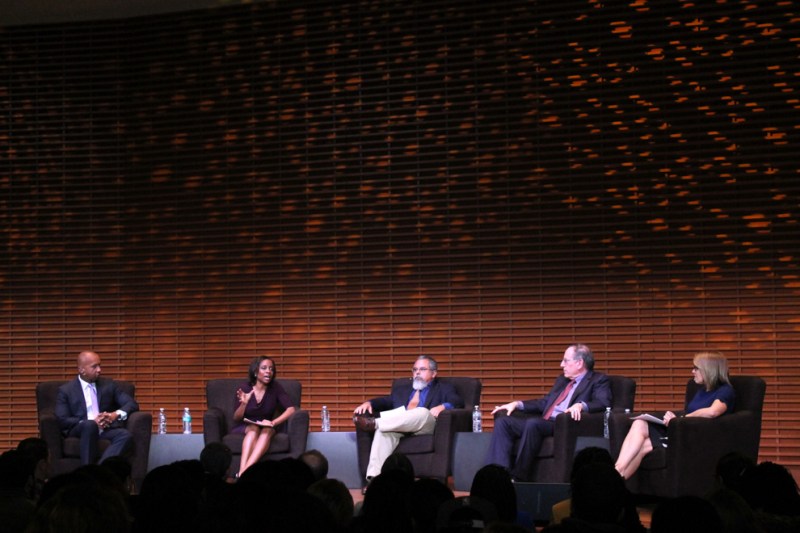
Over 800 people waited outside CEMEX Auditorium for the 2016 Anne and Loren Kieve Distinguished Speaker Lecture on Wednesday evening. As the doors opened, 600 people flowed into the building; 200 were directed into overflow classrooms, where the event was streamed, and dozens more went upstairs to log into available computers and watch a live stream. But regardless of where the lecture was being watched, keynote speaker Bryan Stevenson’s message about race and the criminal justice system was loud and clear.
This lecture, a joint event sponsored by the Center for Comparative Studies in Race and Ethnicity (CCSRE) and OpenXChange, marks the 11th annual lecture uniting leading scholars to discuss issues pertaining to race and ethnicity. This year’s distinguished speaker, Stevenson, is a pioneer in the field of race and ethnicity studies.
Frequently called “America’s Mandela,” Stevenson is the author of “Just Mercy: A Story of Justice and Redemption” and the executive director of the Equal Justice Initiative, a nonprofit that provides legal representation to defendants and prisoners who are denied fair treatment in the legal system. He has seen the inadequacies of the American justice system firsthand through his work fighting unfair sentencing, exonerating innocent death row prisoners and confronting abuse of the incarcerated.
Stevenson addressed these issues in the opening remarks of his lecture.
“This country’s a very different place than it was 40 years ago,” he said. “Six million people are on probation and parole. The percentage of women going to prison has increased 640 percent.”
But, according to Stevenson, the statistic that keeps him up most at night is that “one in three black — born babies are expected to go to jail.”
After discussing the injustice of the justice system in the U.S. and the popular indifference to these problems, Stevenson shifted the focus to solutions. The first solution: proximity.
“We have to get closer to the places where racial inequality manifests itself,” he said.
Having grown up in a poverty-stricken part of Delaware where no schooling past the eighth grade was available for black students, Stevenson explained that he owes his ability to attend high school to lawyers who chose to get proximate to the issue, came into his community and fought for higher education for black students.
“We’ve created this distance between the poorest and most vulnerable children in our society,” he said. “We’ve got to go inside those bad schools. We’ve got to go into prisons. We’ve got to hold those children who are marginalized closer.”
Stevenson also said that we must change the narratives that sustain inequality and injustice.
“We are carrying an illness that has been narrated by indifference,” he said. “I think we need to talk about slavery in America.”
He pointed to a unique and dangerous phenomenon that plagues our country, where people look for exits when the topic of race arises. Stevenson added that we must protect our hope.
“Hope is what gets you to stand up when other people say sit down,” he said.
Stevenson proposed that change requires standing when others sit and speaking when others are quiet. He also brought attention to a fundamental flaw in our criminal justice system.
“We have a system that treats you better if you’re rich and guilty than if you’re poor and innocent,” he said.
He called upon the audience to stop being comfortable with this truth, for, in all his work, he said, he has never seen justice and equality prevail “when people only did what was comfortable and convenient.”
The crowd erupted in a standing ovation as Stevenson finished. Panelists then joined the stage for a roundtable discussion.
Katie Couric, award-winning journalist and moderator of the panel, opened up the conversation.
“Wow, talk about a hard act to follow,” Couric said. “Bryan Stevenson for president, please.”
During the discussion each panelist drew upon their field of expertise to display their concern about the issue of mass incarceration and racism in our criminal justice system and nation at large.
Professor of law Robert Weisberg J.D. ’79 said, “Crime dropped precipitously in the 1990s, but incarceration kept going up.”
Professor of political science Gary Segura suggested that race is at the root of this issue, pointing to stop-and-frisk laws that allow police officers to racially profile. Associate professor of psychology Jennifer Eberhardt drew upon her research with implicit biases, explaining that her studies show that police officers tend to associate words like “arrest,” “capture” and “shoot” with images of black faces more often than with images of white faces.
“Stanford’s falling further behind,” Segura said. “6.1 percent of Stanford’s faculty represents underrepresented minorities. In 1994, it was 4.6 percent. We’ve improved by 1.5 percent in 20 years.”
Contact Sophie Hamilton at sophieh ‘at’ stanford.edu.
